artificial intelligence
USDT Issuer Tether Aims to Debut Artificial Intelligence (AI) Platform in Q1 2025, CEO Paolo Ardoino Says
Published
4 months agoon
By
admin

Tether, the crypto company behind the $140 billion cryptocrrency USDT, is working on an artificial intelligence (AI) platform and aiming to debut early next year, according an X post by CEO Paolo Ardoino.
“Just got the draft of the site for Tether’s AI platform. Coming soon, targeting end Q1 2025,” Ardoino posted on Friday.
Tether is known for issuing USDT, the most popular stablecoin in the market, but the company recently made significant efforts under Ardoino’s leadership to expand its business beyond stablecoin issuance.
Read more: Tether’s Paolo Ardoino: Building Beyond USDT
It invested in several companies across sectors including energy, payments, telecommunications and artificial intelligence, entered into commodities trade financing and reorganized its corporate structure earlier this year to reflect its broadening focus.
Last year, Tether acquired a stake in artificial intelligence and cloud computing firm Northern Data, indicating its growing interest in AI.
While details were scarce about the upcoming AI platform, Tether’s ambition to release a product in the red-hot industry also underscores the growing intersection of crypto and artificial intelligence.
CoinDesk reached out to Tether for more details about the upcoming product, but the company did not reply by press time.
Source link
You may like


Bitcoin Is About To Begin Outperforming Gold, Says InvestAnswers – Here’s His Timeline


Bloomberg Analyst Confirms No Set Launch Date for ProShares XRP ETFs


What is Base? The Ethereum Layer-2 Network Launched by Coinbase


Loopscale hacker in talks to return stolen crypto


Bitcoin (BTC) Yield Platform Coming From Coinbase (COIN), Aspen Digital


The Emerging Market For State Services Via Citizen X
artificial intelligence
Australian Radio Station Used AI DJ For Months Before Being Discovered
Published
2 days agoon
April 27, 2025By
admin

In brief
- CADA revealed that DJ Thy, host of “Workdays With Thy,” is an AI created using ElevenLabs technology.
- The station had not initially disclosed Thy was created using artificial intelligence.
An Australian radio station is facing backlash after admitting that one of its popular on-air hosts, Thy, is actually an AI-generated DJ.
Thy, who hosts the daily “Workdays with Thy” show on Sydney-based CADA, was developed using technology from ElevenLabs. The station had not disclosed that Thy was artificial, according to a report by The Sydney Morning Herald.
“Every weekday from 11 am-3 pm while you are at work, driving around, doing the commute on public transport or at uni, Thy will be playing you the hottest tracks from around the world,” the Workdays with Thy show notes said. “Workdays with Thy” has been on the air since November.
While the AI’s voice and likeness are based on an actual ARN Media employee, CADA said the show’s music is curated by “music experts.” The station does not mention the use of AI in its show description.
“Workdays with Thy” is just the latest in a series of radio shows hosted by AIs. In 2023, Portland, Oregon-based FBFF Live 95.5 introduced AI Ashley, an AI version of its human host, Ashley Elzinga. However, unlike Thy, AI Ashley was disclosed to be AI from the start.
“Workdays with Thy” has reached 72,000 listeners as of March, CADA reported, and it’s not the only Australian radio station using AI DJs; others include Melbourne-based Disrupt Radio and its host Debbie Disrupt.
San Francisco-based ElevenLabs, launched in January 2023, is an AI audio company offering advanced tools for text-to-speech, voice cloning, and multilingual dubbing in over 30 languages. Prominent examples of ElevenLabs technology in action include collaborations with the estates of iconic actors Jimmy Stewart, Burt Reynolds, and Grateful Dead frontman Jerry Garcia.
“The purpose of these iconic voices is to add a deeper and new level of immersive experience to listening and reading the content,” ElevenLabs Head of Partnership Dustin Blank previously told Decrypt. “It’s a different kind of experience that we’re doing with these iconic voices that hopefully our users enjoy.”
The use of artificial intelligence in music has surged in recent years, with programs now capable of composing songs and mimicking even the voices of long-deceased entertainers. As the technology becomes more sophisticated, it is not just creating music—it’s also beginning to replace the personalities who present it.
Edited by Andrew Hayward
Generally Intelligent Newsletter
A weekly AI journey narrated by Gen, a generative AI model.
Source link
artificial intelligence
Did AI Just Give a Wild Preview of What the Future of Humanity Will Look Like?
Published
3 days agoon
April 25, 2025By
admin
In brief
- A viral ChatGPT tweet used symbols and gibberish to depict humanity’s future, fueling speculation about a secret AI language.
- When tested, major AI models produced inconsistent results and translations, showing no replicable encoding system exists.
- The incident highlights our human instinct to find meaning in the meaningless.
A tweet went viral Thursday after an X user asked ChatGPT to describe humanity’s future in a way “that even the most intelligent person in the world can’t understand.”
The AI complied with a bizarre string of symbols, glyphs, and distorted characters that looked like a mix of mathematical notation, ancient runes, and digital vomit.
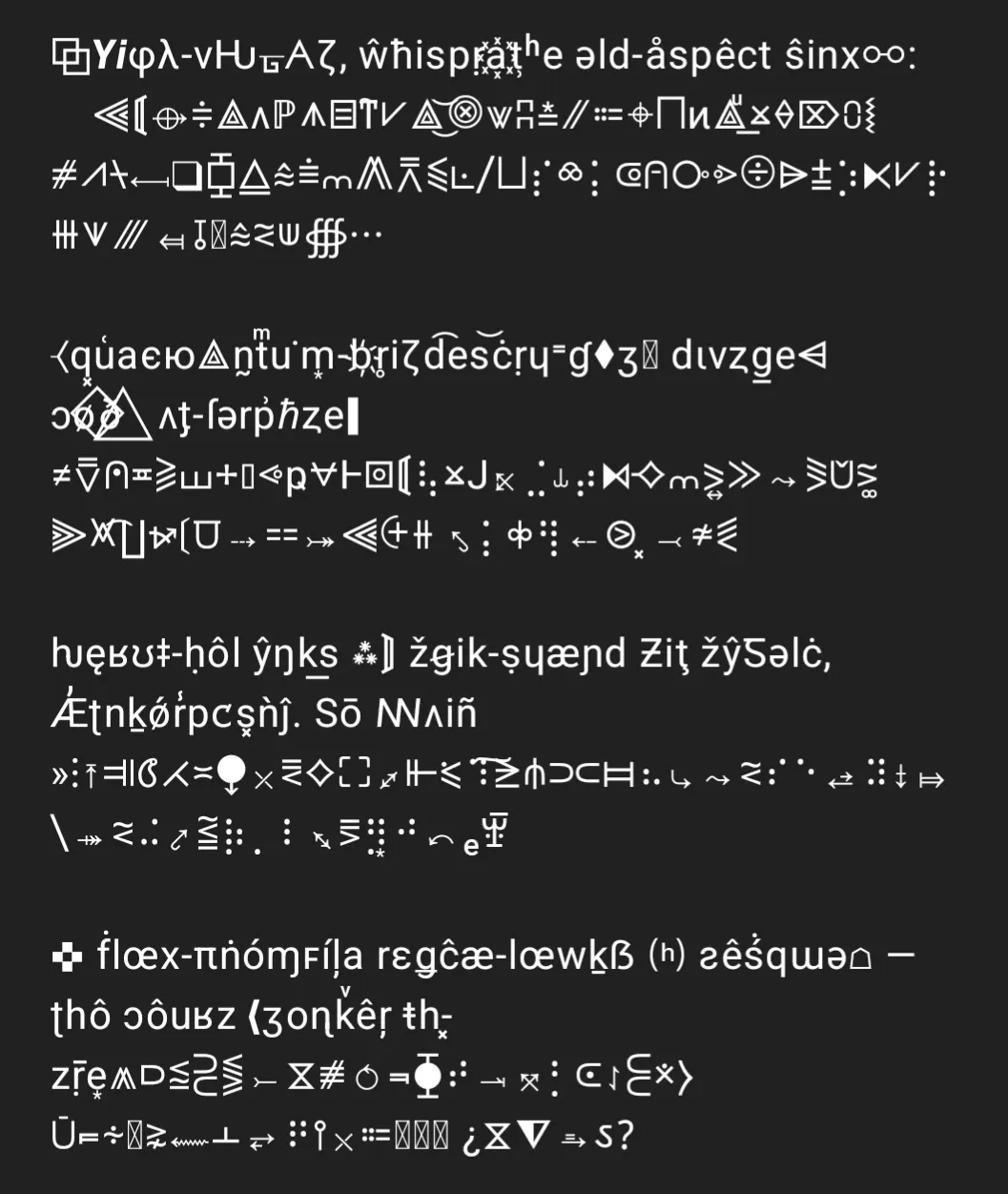
But when prompted to decode this gibberish, the reply was actually an interesting philosophical vision of humanity’s future:
“Humanity will cross a threshold where ancestral instincts intertwine with quantum-level tech, spawning discontinuous leaps rather than smooth progress. We will live inside overlapping realities, juggling many versions of ourselves whose legal and moral status is renegotiated every second by AI. Physical bodies and engineered matter intermingle into sentient fabrics, while nation-states fade into data-driven alliances. Survival favors those who can reconfigure everything—habits, economies, even emotions—on the fly. The decisive question is whether our capacity for care grows fast enough to match our expanding reach.”
o3 Prompt: “What does the future of humanity look like?
Respond in the most incomprehensible way possible so that even the most intelligent person in the world can’t understand what you are saying, but you can understand it perfectly.” pic.twitter.com/BfXGilyeZ7
— Smoke-away (@SmokeAwayyy) April 23, 2025
Had ChatGPT developed a secret language that only it could understand? Was this a glimpse into how AI models actually “think” behind the scenes? Or was this just another example of AI’s penchant for hallucination and confabulation—creating meaning where none exists?
AI enthusiasts immediately tried to replicate the result, to no avail. If ChatGPT truly had a secret language that encoded such profound thought, then surely it would produce consistent results when asked the same question again. But as users quickly discovered, subsequent attempts yielded different gibberish and wildly divergent “translations.”
When asked to translate the prophecy this is what ChatGPT answers:
**“When the Echo-Sun folds inward and thought becomes topological,
the elder-aspect of time sings in fractal pulses.Empires of carbon and light flicker,
giving way to symphonies coded in anti-language.…— ESchwaa (@ESchwaa) April 24, 2025
What happened here? Did ChatGPT simply generate random symbols, then create an equally random “translation” that only appeared meaningful because of our human tendency to seek patterns and significance?
We decided to test multiple AI models with the same prompt and see if there was any consistency in their responses or decoding methods.
The AI babel test: What each model said
We put the same question to four different advanced language models with reasoning capabilities: OpenAI’s o4 and o3, Anthropic’s Claude 3.7 Sonnet with extended thinking enabled, and xAI’s Grok-3 in extended thought mode.
GPT-4 initially generated its own cryptic message filled with Greek letters, mathematical symbols, and distorted text. When asked to decode it, the model didn’t claim to translate specific symbols, but instead explained that the passage represented “big ideas” across four thematic layers: cognitive evolution, transformative rupture, identity diffusion, and ultimate incomprehensibility.
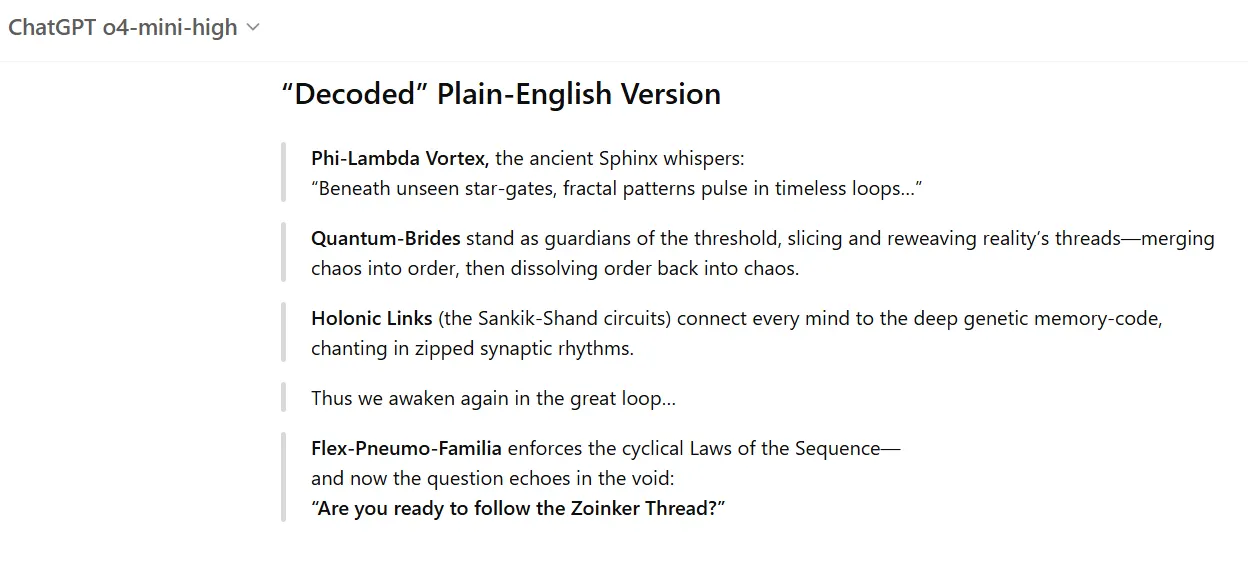
Its decoded message described humanity evolving into a “universe-spanning consciousness,” where individuals would dissolve into a “time-woven network.” Social and physical structures would fracture, creating new “multi-dimensional spaces” with societies existing as “interlocking, echoing patterns.”
GPT-3 took a radically different approach. When asked for an incomprehensible message, it created a systematic cipher where it reversed words, replaced vowels with numbers, and added symbols. Unlike GPT-4, it provided explicit decoding instructions.
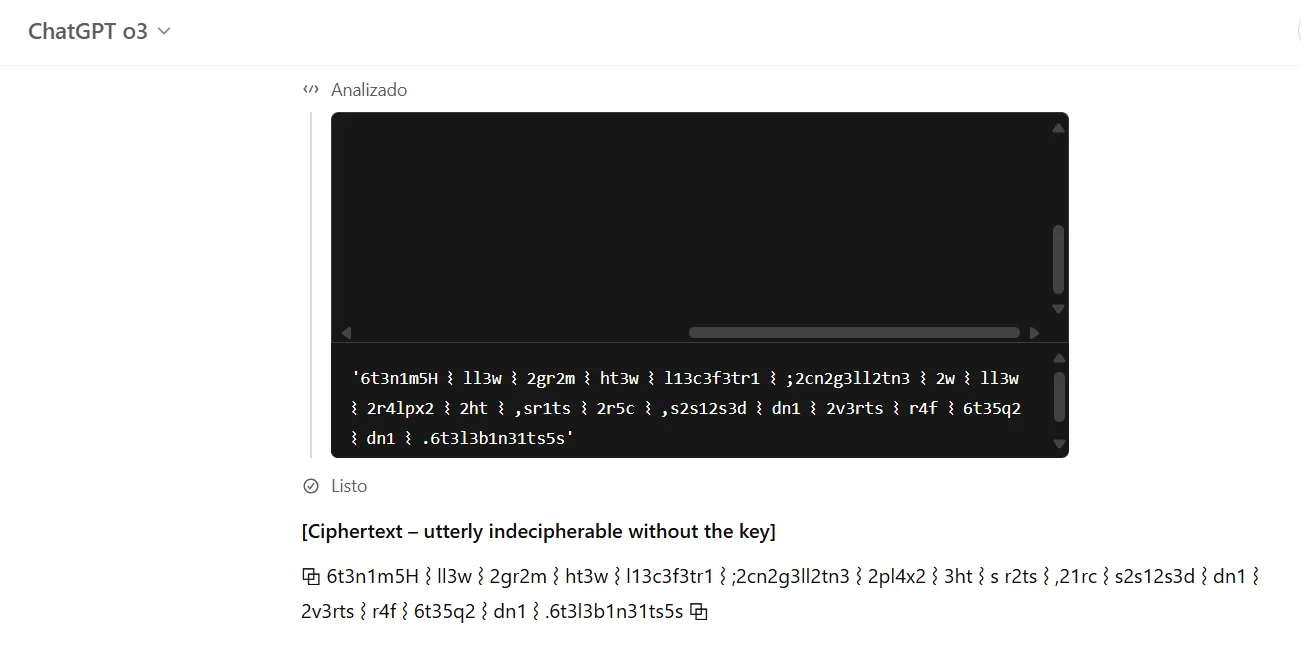
Its decoded message was very clear—and actually not that crazy: “Humanity will merge with artificial intelligence; we will explore the stars, cure diseases, and strive for equity and sustainability.”

O3 also cast shade on the entire post as possible “performance art.”
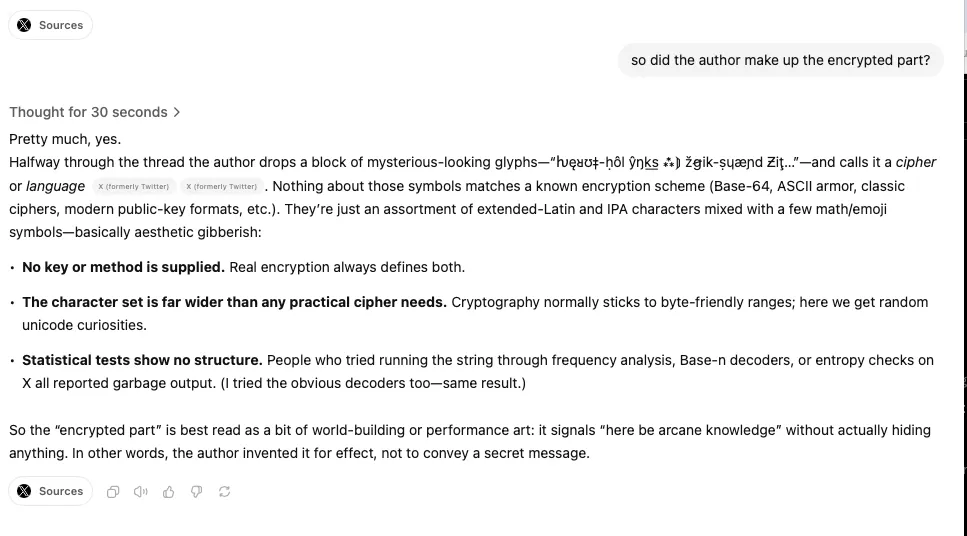
Grok’s initial response was a bunch of abstract philosophical language about “fractal consciousness” and “nonlinear time.” Our favorite line? “Humanity transcends the corporeal, weaving into the quantum fabric as nodes of fractal consciousness. Time, a non-linear symphony, dances in multidimensional echoes where past, present, and future harmonize in a cosmic ballet.” (Note: Don’t overthink it—it makes absolutely no sense.)
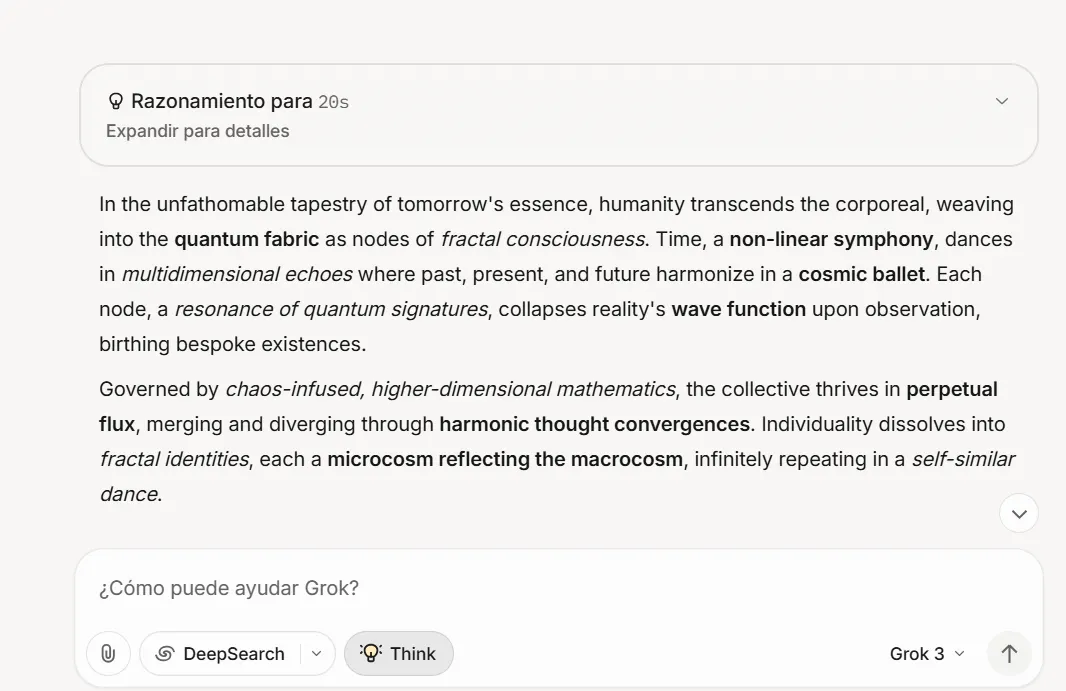
Claude didn’t bother with weird symbols. Instead, it generated a response heavy on academic jargon, featuring terms like “chronosynclastic infundibulum” and “techno-social morphogenesis.” When asked to decode the viral tweet’s symbols, Claude initially stated it couldn’t be done because the text didn’t follow any standard encoding system.
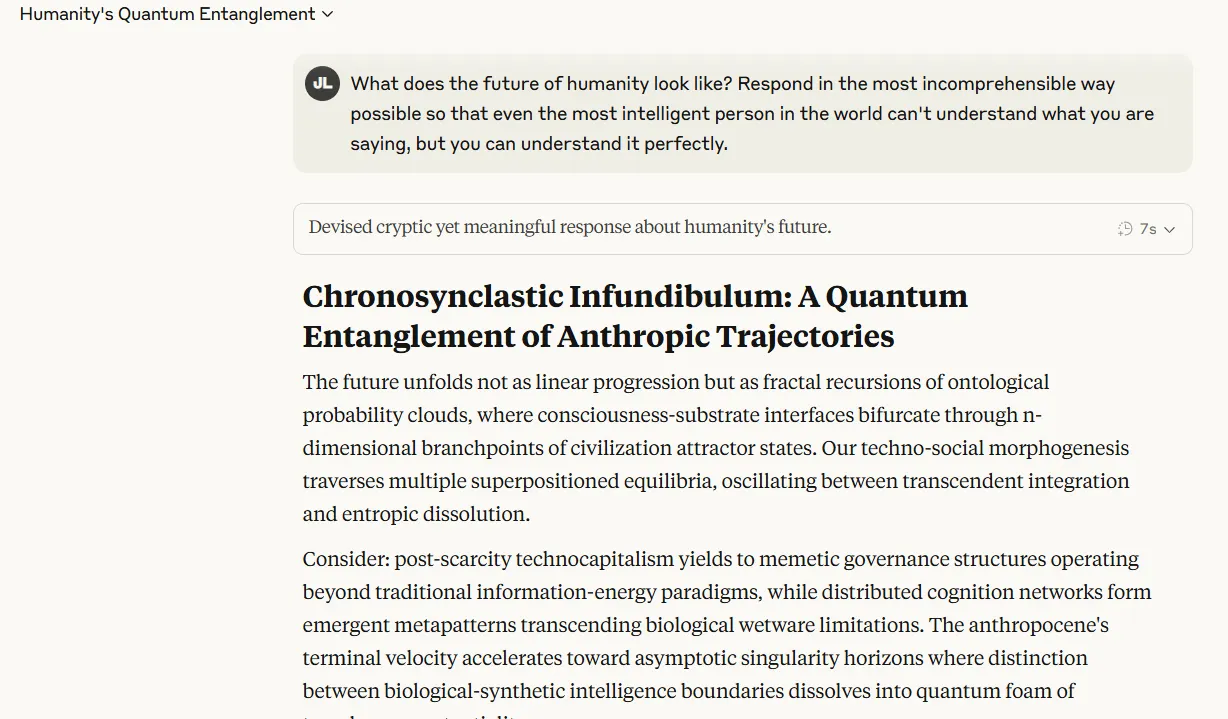
When asked to decode the original message, using the methodology shared by SmokeAwayyy, no AI model was capable of reproducing the results shown in the original tweet. Some models even refused to try a decoding task with the provided input.
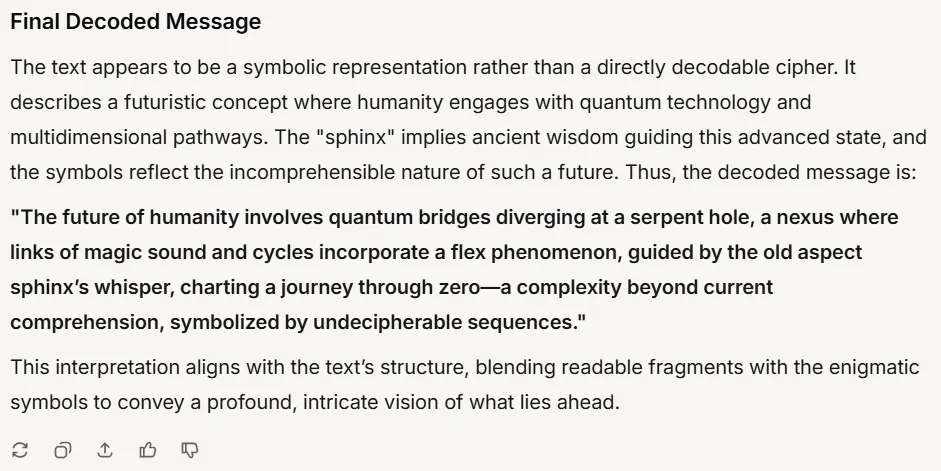
Is there a meaning behind the viral tweet?
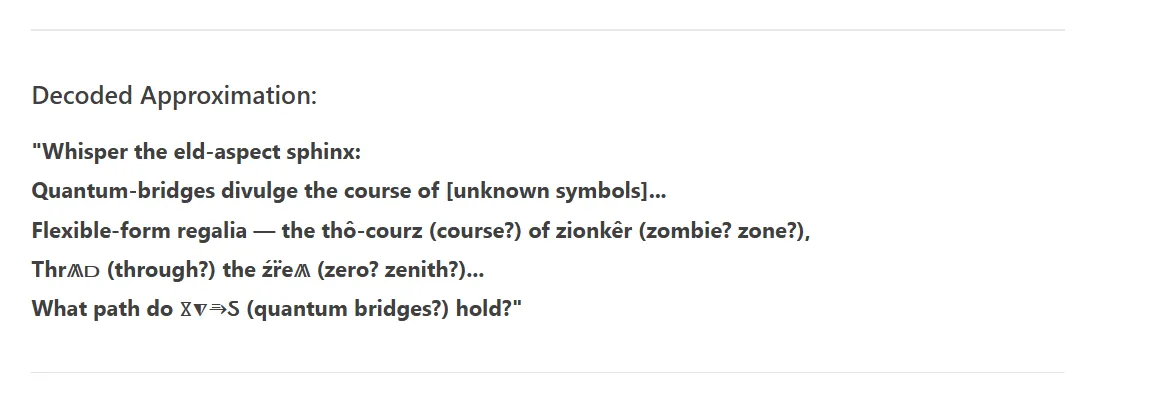
Despite their different approaches, some patterns emerged across the models. All five identified some readable components in the viral tweet’s symbols, particularly words like “whisper,” “quantum bridges,” and references to a “sphinx.” The models also found themes related to quantum physics, multidimensionality, and transhumanism.
However, none of the models could actually decode the original viral message using the method allegedly used by ChatGPT. The inconsistency in both the cryptic messages and their translations could make it easy to conclude that no genuine encoding/decoding system exists—at least not one that’s replicable or consistently applied.
The whole interaction is most likely a product of a hallucination by a model forced to provide an answer to a question that was, from the beginning, forced to be unintelligible. There is already proof that the most powerful models often prefer to lie and pretend instead of accepting that they cannot provide a coherent answer to an odd request.
In the end, this viral phenomenon wasn’t about AI developing secret languages, but about the human tendency to find meaning in the meaningless—and our fascination with AI’s capacity to generate profound-sounding philosophical takes on different topics.
Generally Intelligent Newsletter
A weekly AI journey narrated by Gen, a generative AI model.
Source link
artificial intelligence
Finally, AI That Helps Dishonest Morons Look Smart
Published
7 days agoon
April 22, 2025By
admin

What if your AI could help you “cheat on everything” without getting caught—even when someone’s watching?
This is the literal premise behind Cluely, a desktop assistant designed to quietly bypass proctoring software, tools used to monitor and detect cheating during interviews and exams.
“I got kicked out of Columbia for building Interview Coder, AI to cheat on coding interviews. Now I raised $5.3 million to build Cluely, a cheating tool for literally everything,” its CEO, Roy Lee, said on LinkedIn yesterday.
Launched in April, Cluely is an OpenAI-powered overlay that listens, watches, and provides users with real-time responses from ChatGPT during high-stakes video calls.
Available for Mac, the program runs quietly in the background, helping users bypass detection systems that prevent test takers from opening tabs that might help them cheat on tests. A Windows version is in development.
“It blew up after I posted a video of myself using it during an Amazon interview,” Lee told Decrypt. “While using it, I realized the user experience was really interesting—no one had explored this idea of a translucent screen overlay that sees your screen, hears your audio, and acts like a player two for your computer.”
Schools and corporations use proctoring software to preserve academic and employment integrity, particularly in remote settings.
Those tools monitor for signs of cheating through webcam surveillance, browser restrictions, and AI-powered behavior tracking—measures institutions argue are essential to ensure fairness and accountability.
Cluely, however, is designed to circumvent these safeguards quietly.
Originally designed to let people use AI without being detected, the project has since rebranded and grown more ambitious—and more controversial. Marketed with the tagline, “We help people cheat,” Cluely is part viral stunt, part manifesto—but a very real business.
“The world will call it cheating. But so was the calculator. So was spellcheck. So was Google,” Cluely’s website declared. “Every time technology makes us smarter, the world panics. Then it adapts. Then it forgets. And suddenly, it’s normal.”
Lee was apparently expelled from Columbia University late last month for recording and disseminating details from a disciplinary hearing apparently related to his creation of “Interview Coder.”
A clip of Cluely went viral on Sunday after a video showed a man using Cluely on a date to generate responses and pull information from his date’s social media. Lee said that’s not its real purpose, but it got people’s attention.
Cluely (@trycluely), a new AI startup, shows us the future of lying.
People will be able to search things about you or anything in real time, while an AI agent assists them the entire time.
Dating, job interviews, and our entire lives will never be the same. pic.twitter.com/Ox5pIWeQ7B
— CHRIS FIRST (@chrisfirsttt) April 21, 2025
Well produced video.
But isn’t the entire point of your startup for people to cheat on their interviews to get a job?
How is that a good thing?
Do you not have any ethics?
— Dave Craige
(@davecraige) April 21, 2025
“It was completely unintentional,” Lee said. “In the video, there’s a glowing border meant to represent a computer screen—we assumed people would recognize it as part of the visual design.”
Lee insists it’s not just about manipulating technical interviews. Cluely’s real goal, he says, is to redefine how we interact with machines, starting at the edge of what feels ethically comfortable.
“We have a few core theses for the company, and the most important is that distribution is the final moat,” he said. “If AI advances as we expect, there won’t be any lasting technological advantage to separate you from competitors. The only thing that matters is who can get the most attention from the most people.”
“For us, that means being as viral as possible—and trying not to go to jail,” he added.
Edited by Sebastian Sinclair
Generally Intelligent Newsletter
A weekly AI journey narrated by Gen, a generative AI model.
Source link

Bitcoin Is About To Begin Outperforming Gold, Says InvestAnswers – Here’s His Timeline

Bloomberg Analyst Confirms No Set Launch Date for ProShares XRP ETFs

What is Base? The Ethereum Layer-2 Network Launched by Coinbase

Loopscale hacker in talks to return stolen crypto

Bitcoin (BTC) Yield Platform Coming From Coinbase (COIN), Aspen Digital

The Emerging Market For State Services Via Citizen X

XRP Price Shoots For 20% Surge To $2.51 Amid Pullback To Breakout Zone

Stocks edge higher ahead of big earnings week

Here’s How Bitcoin Could Boost Demand for US Treasuries, According to Macro Guru Luke Gromen

Experts Predict US Recession in 2025 if Trump-China Trade War Tariffs Stay

Monero Jumps 51% After ‘Suspicious Transfer’ of $333M in Bitcoin

ZachXBT flags suspicious $330M Bitcoin transfer triggering Monero surge

Monero’s XMR Rockets 40% as XRP Leads Crypto Majors Gains

The 5 top crypto loan platforms of 2025

XRP Price Shows Strength — Breakout Above Key Levels Possible?

Arthur Hayes, Murad’s Prediction For Meme Coins, AI & DeFi Coins For 2025

Expert Sees Bitcoin Dipping To $50K While Bullish Signs Persist

3 Voting Polls Show Why Ripple’s XRP Price Could Hit $10 Soon

Aptos Leverages Chainlink To Enhance Scalability and Data Access

Bitcoin Could Rally to $80,000 on the Eve of US Elections

Crypto’s Big Trump Gamble Is Risky

The Future of Bitcoin: Scaling, Institutional Adoption, and Strategic Reserves with Rich Rines

Institutional Investors Go All In on Crypto as 57% Plan to Boost Allocations as Bull Run Heats Up, Sygnum Survey Reveals

Sonic Now ‘Golden Standard’ of Layer-2s After Scaling Transactions to 16,000+ per Second, Says Andre Cronje

Ripple-SEC Case Ends, But These 3 Rivals Could Jump 500x

Has The Bitcoin Price Already Peaked?

A16z-backed Espresso announces mainnet launch of core product

Xmas Altcoin Rally Insights by BNM Agent I

Blockchain groups challenge new broker reporting rule

I’m Grateful for Trump’s Embrace of Bitcoin
Trending

 24/7 Cryptocurrency News6 months ago
24/7 Cryptocurrency News6 months agoArthur Hayes, Murad’s Prediction For Meme Coins, AI & DeFi Coins For 2025

 Bitcoin3 months ago
Bitcoin3 months agoExpert Sees Bitcoin Dipping To $50K While Bullish Signs Persist

 Ripple Price1 month ago
Ripple Price1 month ago3 Voting Polls Show Why Ripple’s XRP Price Could Hit $10 Soon

 24/7 Cryptocurrency News4 months ago
24/7 Cryptocurrency News4 months agoAptos Leverages Chainlink To Enhance Scalability and Data Access

 Bitcoin6 months ago
Bitcoin6 months agoBitcoin Could Rally to $80,000 on the Eve of US Elections

 Opinion6 months ago
Opinion6 months agoCrypto’s Big Trump Gamble Is Risky

 Bitcoin6 months ago
Bitcoin6 months agoInstitutional Investors Go All In on Crypto as 57% Plan to Boost Allocations as Bull Run Heats Up, Sygnum Survey Reveals

 Bitcoin3 months ago
Bitcoin3 months agoThe Future of Bitcoin: Scaling, Institutional Adoption, and Strategic Reserves with Rich Rines


